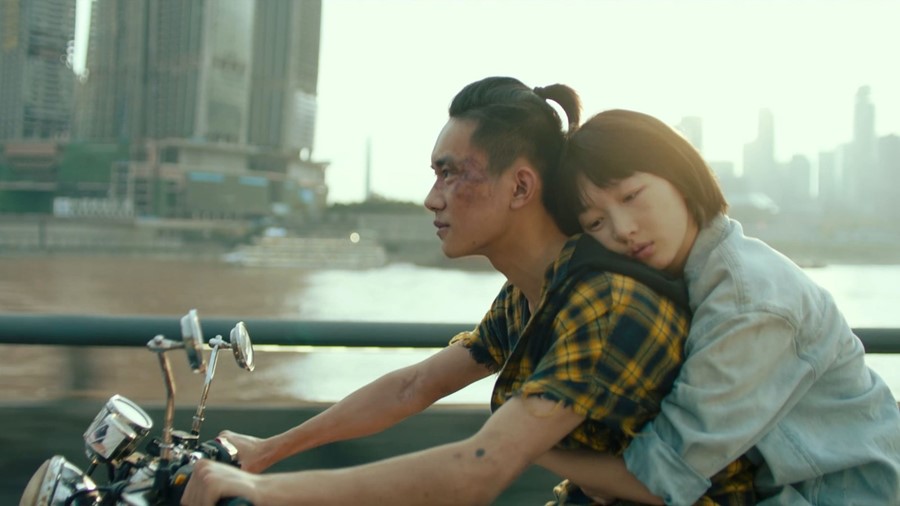James Balmont takes a closer look at five examples of the crime film renaissance that marks out post-handover Hong Kong cinema
In 2021, Hong Kong scored its first major Oscar nomination since the 1997 handover, as Derek Tsang’s brutal school bullying drama Better Days made the shortlist for Best International Feature Film for the first time since Chen Kaige’s 1993 drama Farewell, My Concubine. And while the prize eventually went to Thomas Vinterberg’s binge-drinking comedy-drama Another Round, this was a feat, nonetheless, worth savouring.
By the time the 25-year transfer of power between former colonial rulers Britain and mainland China began in 1997, both production and box office receipts since 1992 had already fallen by half. Many of the filmmakers who had cemented the early 90s as a Golden Age for Hong Kong cinema, like Ringo Lam (City on Fire), John Woo (Hard-Boiled) and Wong Kar-wai (Chungking Express), were fleeing the region over fears of stifled creative liberties and diminished work opportunities under Chinese rule. And as legislative amendments as recent as June 2021 have proven, their anxieties were valid. Under the name of National Security Law this month, China decreed that Beijing’s strict censorship rules will now apply to new Hong Kong film productions – with fears growing that they will also soon be retroactively applied to past works as well.
Hong Kong cinema after 1997, nonetheless, manifested the anxiety gripping the nation and used it as the catalyst for a vein of rich crime cinema in the years that followed. Beyond highlights like Derek Yee’s One Night in Mongkok and Johnnie To’s Election, 2002 sensation Infernal Affairs – a gutter-circling pursuit concerning an undercover police informant and a corrupted police officer – would prove the shining example of the region’s enduring prosperity within the genre. Martin Scorsese adapted the film as quadruple Oscar-winner The Departed in 2006, with Matt Damon, Leonardo DiCaprio and Jack Nicholson in leading roles.
Elsewhere, a plethora of nuanced, allegorical and vibrant crime films bridge the gap between the uncertain age of the handover and the questionably better days of Better Days. In July, the UK’s Chinese Visual Festival will prove that Hong Kong’s versatile industry is capable of resilience in the face of adversity, as contemporary crime dramas like Drifting and Shadows point towards continued cinematic prowess. They screen at venues including the BFI, alongside 00s classics like PTU.
With the latter film also arriving on Blu-ray via Eureka the same month, AnOther opted to take a closer look at five examples of the crime film renaissance that marks out post-handover Hong Kong cinema – a vital reappraisal as the region’s filmmakers face their darkest hour.
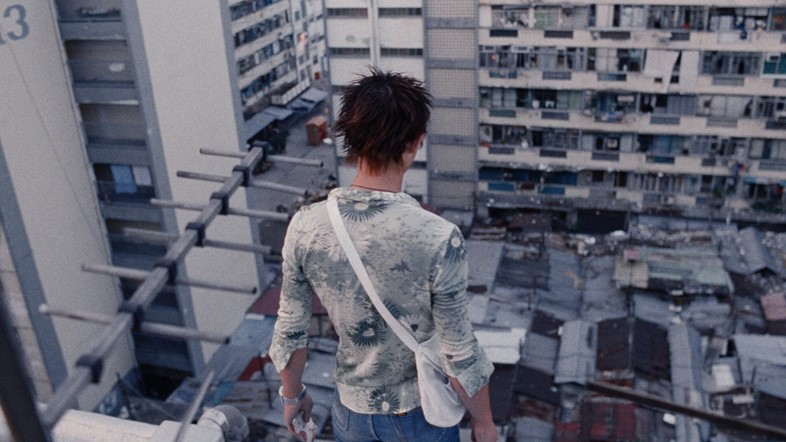
Made In Hong Kong, 1997
A tantalising example of true guerilla filmmaking, Made In Hong Kong would be the first independent film completed in Hong Kong after the handover began. Made using discarded film stock with actors director Fruit Chan found on the streets, the movie was produced as a direct reaction to both Chan’s frustrations with the traditional Hong Kong studio system, and the widespread unease gripping young people in the lead-up to 1997.
The story concerns nihilistic hoodlum Mid-Autumn, who “wasn’t cut out for studying, [and has] nothing to do but hang out in playgrounds shooting hoops, getting into fights.” But after he witnesses the suicide of a young woman (in a scene that notably foreshadows Better Days), he makes it his mission to deliver two letters found near her body. His journey is riddled with wet dreams, bottle-smashings and bad tempers, as he struggles to find his place amidst Hong Kong’s mighty urban sprawl.
Chan’s masterwork is a transgressive analogy of the region’s identity crisis at the dawn of an anxious metamorphosis. Across a rich montage of images, the film traverses landmarks like the Peak Tram and the terraced cemetery of Pok Fu Lam, yet it seems rooted in public toilets, cramped bedrooms and dingy alleyways between the towering apartment blocks of subsidised housing projects. Slow-motion footage, freeze-frames and dream sequences elevate the washed-out colour images, before the climactic dialogue of a radio broadcaster quoting Maoist propaganda ends the film on an ominous high note. “Young people are so full of energy,” Mao had declared. “We place our hopes in you.”
Despite having a budget of just HK$500,000, Made In Hong Kong took home three Hong Kong film awards in 1998, including Best Film and Best Director. Its success inspired two further films from Chan, with The Longest Summer and Little Cheung completing a trilogy of 1997-themed features.
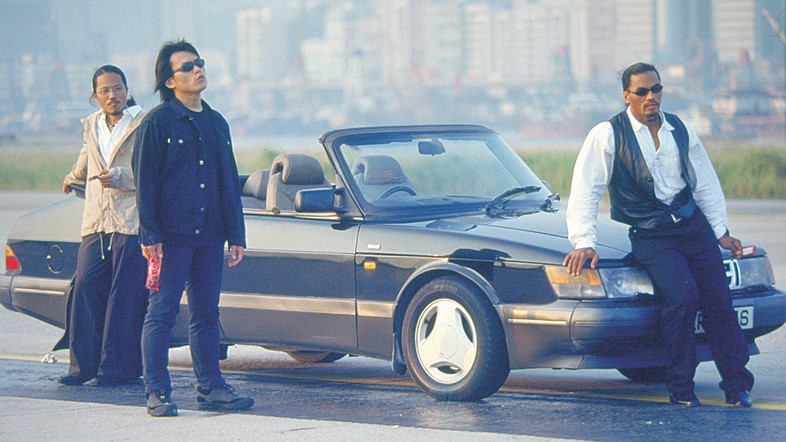
Time and Tide, 2000
Released on Blu-ray for the first time in the UK in May 2021, this fast-paced action thriller announced with a deafening bang one of Hong Kong’s most prominent “Golden Age” directors for a new millennium. Formerly known for films like 1983 fantasy classic Zu Warriors from the Magic Mountain (a noted influence on John Carpenter’s Big Trouble In Little China), and 1991 Jet Li action-adventure Once Upon a Time in China, Time and Tide would be Tsui’s comeback after the director briefly decamped to Hollywood over fears he’d not be able to work in Hong Kong under Chinese rule.
The dynamic thriller concerns a cavalcade of intertwined plot points: a reckless bartender-turned-bodyguard has impregnated a bisexual police officer after a one night stand; a South American gang attempts a hit on a prominent mob boss; a former thug finds himself drawn back into a world of crime having attempted to go straight. All the while, chaos seems to loom on the horizon as the film edges ever closer to a tumultuous showdown (“Welcome to cockroach city,” sneers one dreadlock-haired brute – a statement that seems to hang over the entire film).
Fusing classic noir tropes with a style befitting of the MTV generation, Time and Tide feels indebted to the films of Wong Kar-wai thanks to its radiant filmmaking energy. Rapid-fire editing, frenetic jump cuts, and delirious handheld camera work dictate the adrenaline-pumping pace from the get-go. And if it were not for the train-station-sized shootouts and tower block parkour you could almost be fooled into thinking you were watching Chungking Express.
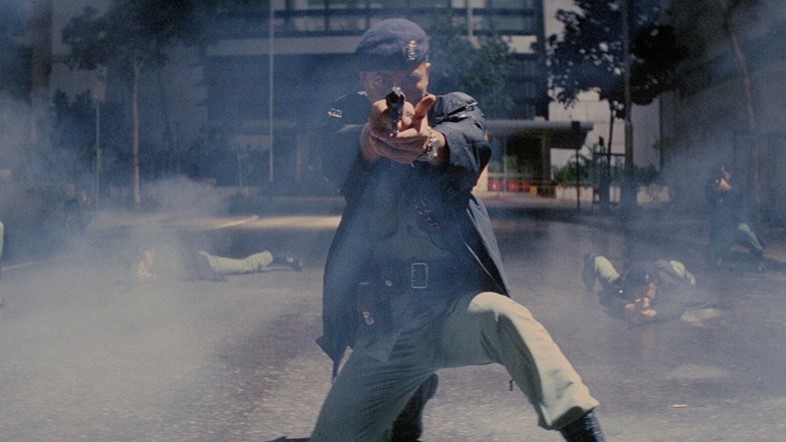
PTU, 2003
Since founding independent production house Milkyway Image in 1996, the prolific Johnnie To has cemented himself as one of the region’s true cinematic greats, excelling in dark crime films in the vein of French director Jean-Pierre Melville as well as super-stylised action vehicles. In June 2021, PTU marks the third To film to be released on Blu-ray via Eureka’s heralded ‘Master of Cinema’ series, consolidating his reputation as a granddaddy of Y2K Hong Kong crime films.
The character-led drama follows a group of increasingly corrupt police factions as the hunt for a sergeant’s stolen gun turns into a violent, night-time cat-and-mouse chase around Kowloon City. But unlike your average cops v thugs picture, the scant action scenes in PTU merely punctuate a precarious equilibrium, as a potent atmosphere is built via wide-angle camerawork, suspenseful face-offs, and intense silences.
The catalyst for it all is the execution of a triad in a fast-food outlet during the film’s opening – an event that echoes a real-life crime case that took place in the city a year prior to the film’s release. Businessman Harry Lam was executed by a triad hitman while sitting at his table eating breakfast at Luk Yu teahouse. The assailant, a former television actor, was later apprehended and sentenced to death on the mainland. The wider narrative concerning a policeman’s lost gun, meanwhile, mirrors the notorious case of Tsui Po-ko, a delusional police officer who murdered a fellow constable, stole his gun, and robbed a bank in 2001.
The theme of police corruption and brutality will no doubt resonate strongly today both in Hong Kong and across the globe. For this tense, moody and contemplative effort, To was awarded Best Director at the Hong Kong Film Awards in 2004, with PTU receiving a further nine nominations that year. It lost the Best Picture award to Running on Karma – another action thriller directed by To.
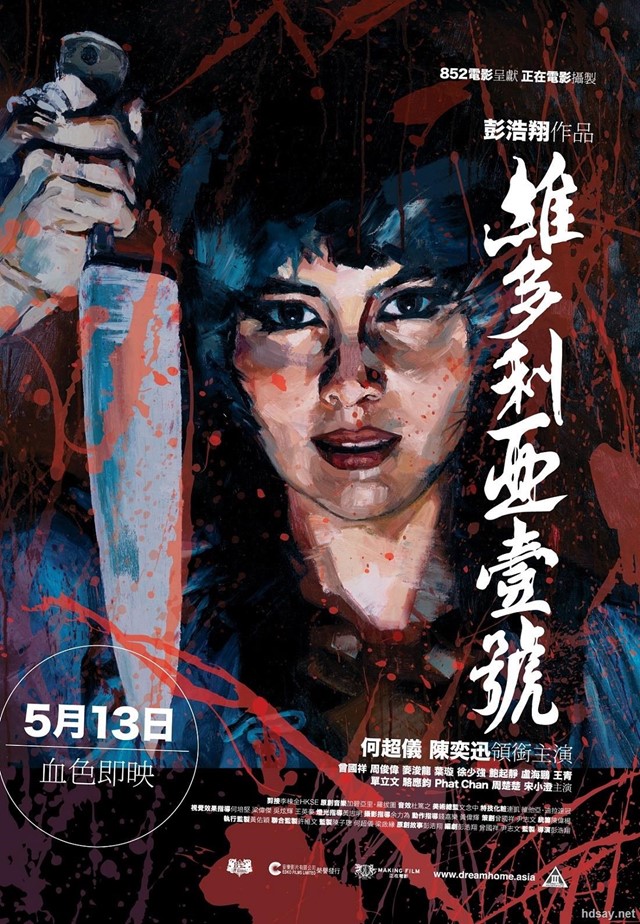
Dream Home, 2010
“Since the Handover, Hong Kong people’s income has increased by one per cent,” reads the opening scrawl of Pang Ho-cheung’s Dream Home. “But in 2007 alone, house prices shot up by 15 cent. A 2007 survey shows that the average monthly income in Hong Kong is HK$10,100 per person … [And yet] a flat of 600sq feet costs more than HK$7 million.”
Taking inspiration from both Hollywood B-movies and the East Asian horror boom of the early 00s, Dream Home is a no-holds-barred Hong Kong slasher that goes straight for the jugular. Actor-producer Josie Ho turns in a powerhouse performance as a call-centre worker driven to madness as her homeowner aspirations are thwarted by a society defined by toxic masculinity and an extortionate housing market. And while the film’s setting in Hong Kong – one of the most densely populated places on Earth – amplifies the satirical tendencies, the film resonates just as strongly alongside the ballooning house prices in the present-day UK.
With countless taboos broken – gory disembowelments, penis choppings, threesomes and drugs among them – the Category III-rated film was censored in Hong Kong and banned outright in Singapore. Ho’s own indie production company 852 Films, who backed Dream Home as its first feature, has since become an international prospect nonetheless – attracting directors Luc Besson (Léon: The Professional) and Academy Award-nominee Mike Figgis (Leaving Las Vegas) to Hong Kong for a duo of features in 2021.
Wary of the likelihood of increased censorship from the Mainland Chinese government, Ho and 852 Films have simultaneously begun to produce films in the West. Bible-bashing, LA-set, lesbian drug thriller Habit (which stars Bella Thorne, Andreja Pejic, The Kills and Paris Jackson as Jesus) has already stirred up a storm of controversy ahead of its release later this year: a petition signed by over 370,000 people has called for it to be banned due to blasphemous content.
Better Days, 2019
Director Derek Tsang served as a writer and line producer on Dream Home. A decade later he would make history with Better Days, the first Hong Kong movie to be nominated for the Academy Award for Best International Feature Film in 27 years.
Tsang’s movie paints a vivid picture: the story of a teenage girl physically brutalised at school following the suicide of a classmate, Better Days initially feels more like a prison movie than a teen drama. Only when long-suffering Chen Nian finds solace in the company of a homeless thug does her life seem to turn a corner – but with China’s ruthless college entrance exams looming and the criminal exploits of her only friend catching up with him, her world hangs on a knife-edge.
Released to a backdrop of mass mobilisation against the Chinese government, Better Days is symptomatic of a society whose future looks increasingly troubled. “Science fiction and fantasy used to be common,” Hong Kong Baptist University professor Dr Enoch Tam told The Telegraph in April, but for filmmaking students in the present, he says, “darker stories now predominate.”
The film didn’t take home the Oscar in the end. But with over $230 million grossed worldwide, and an armful of prizes awarded at the Hong Kong Film Awards in 2020, Tsang’s resonant drama offers hope for the future of the Hong Kong film industry, even as the region once again faces an uncertain future.
